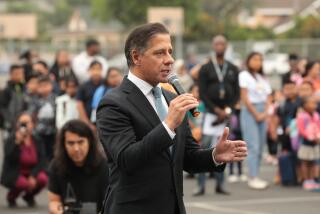80 Students Stay Out of School in Latino Boycott
- Share via
Abigail Ramirez was one of more than 80 children kept out of downtown’s Ninth Street School by Latino parents Tuesday in a protest against bilingual education, and she wanted to talk about why.
“My mom is worried because she wants that I speak English and do right my work,” the fourth-grader said, taking a break from making a valentine at Las Familias del Pueblo, the skid row community center where the boycott was organized.
It is just such persistent difficulty with the English language--particularly with reading and writing--that led 63 parents to endorse the strike after a series of letters, verbal requests and parent petitions demanding English-only classes produced no results.
By state law, immigrant parents must be offered English-as-a-second-language instruction for their children. Los Angeles Unified School District Supt. Sid Thompson said he was meeting with bilingual administrators Tuesday and again today “to make sure that option is being offered in this case.”
However, the striking parents want more than high-level meetings about them. They vowed to continue the boycott today after the principal and the school board president declined hand-delivered invitations to meet them Wednesday night.
“What an inappropriate response from a public agency,” said Las Familias Director Alice Callaghan. “They work for the children. They seem to have forgotten that.”
Every missed school day costs the district state funding, which is calculated on average daily attendance. State Department of Education officials estimated that each absent student represents about $20--or about $1,600 a day for the Ninth Street strikers.
Board President Mark Slavkin said he was dismayed that students were being held out of school, but believed that the dispute should be handled at the campus level.
“I don’t want to reinforce the idea that this is about going up the chain of command,” he said.
Ninth Street Principal Eleanor Vargas Page said she would prefer that protesting parents come to the regular monthly parent meeting--scheduled Thursday evening at the school--so that “all of our parents . . . have the same information and accurate information.”
Vargas Page said she was perplexed by the protest because only four parents applied for English-only instruction this year, and three were granted it. About 90% of Ninth Street’s students do not speak English, but fewer than a fifth are in English-based classes full time.
Many of the boycotting parents said they never applied to change their child’s program because they felt intimidated by the school bureaucracy. Instead, they took their concerns to Callaghan, they said, because they were more comfortable acting as a group.
Ninth Street officials portray their approach to native-language instruction as more liberal than that of many district schools.
A recently revised class schedule shows that 90% of the school day is spent in English, though a closer look indicates that the English category includes recess and homeroom.
At the campus Tuesday, the contrast between the perspectives of the school and the protesting parents was stark.
Assistant Principal Oscar Kreis cleared a path to the side gate for entering students as about three dozen protesters passed out leaflets, entitled “Padres”--Parents.
“This is a pet peeve of one person,” Kreis said, referring to Callaghan. “We have 150 parents show up for parent meetings, and none of them have ever complained about this.”
Yet at least six additional parents took their children home after reading the leaflet Tuesday, while many others agreed to attend Wednesday’s meeting.
“Nearly all the parents here say the same thing as these parents,” parent Vicky Valdez said in Spanish. “We are afraid to speak up, we Latinos--that’s the truth. But once we hear someone saying what we believe, we will join in.”
A few blocks away at Las Familias, pandemonium reigned. The din of children’s voices filled the center as students played table pool, worked jigsaw puzzles and constructed a Lego house.
The arrival of each member of the media sent a wave of excitement through the center, and most reporters left with a glitter-laden valentine crafted just for them.
Despite Callaghan’s promise that the children would spend the day speaking English, the lack of formal instruction made fulfillment impossible. But here and there, efforts were made.
Volunteer teacher Lydia Lopez, a member of the Las Familias board, sat in a corner helping children thread string through sewing cards. She only gave them the card of their choice if they identified it in English.
“Do you want to play with us?” Lopez asked, speaking slowly. “Which card would you like?”
More to Read
Sign up for Essential California
The most important California stories and recommendations in your inbox every morning.
You may occasionally receive promotional content from the Los Angeles Times.













